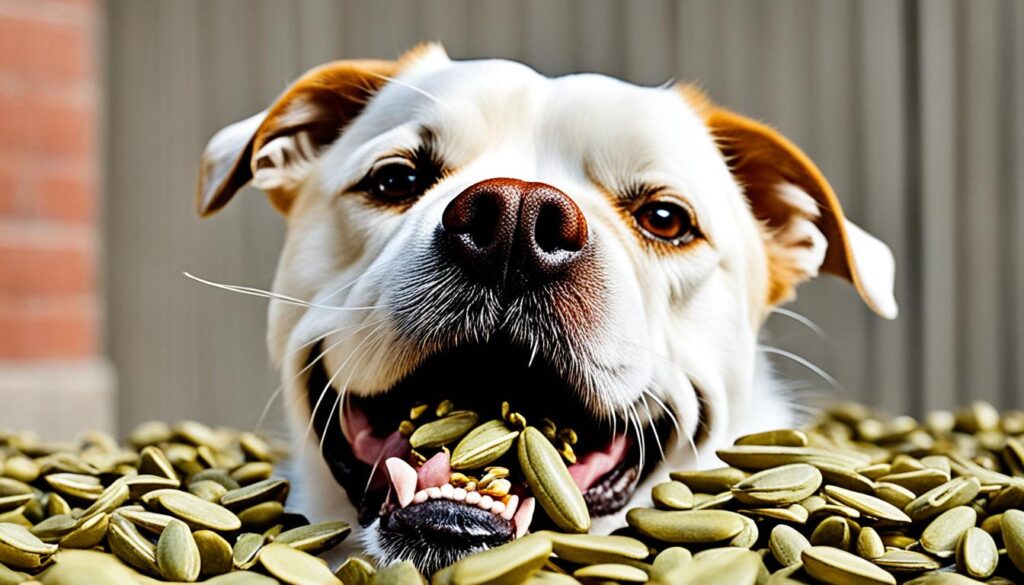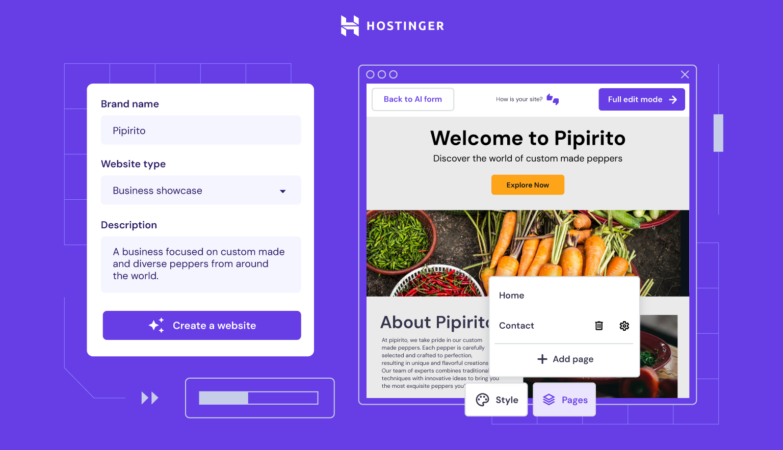Sunflower seeds are a popular snack enjoyed by many people. But can dogs eat sunflower seeds too? Before you share this tasty treat with your furry friend, it’s important to understand the potential risks and benefits involved.
When it comes to feeding sunflower seeds to dogs, there are a few key considerations. Providing dogs with unsalted, shelled sunflower seeds in moderation can offer some nutritional benefits, including protein, fiber, and vitamins. However, it’s crucial to consult with a veterinarian before adding sunflower seeds to your dog’s diet, as their specific dietary needs should be taken into account.
Dogs should never be given salted sunflower seeds, as the excess sodium can be harmful to their health. Additionally, it’s important to remember that sunflower seeds should not replace a dog’s regular diet but rather be offered as an occasional treat.
Key Takeaways
- Feeding unsalted, shelled sunflower seeds in moderation can provide dogs with essential nutrients.
- It’s crucial to consult with a veterinarian before introducing sunflower seeds to a dog’s diet.
- Feeding guidelines recommend 10 to 40 seeds per week, depending on the size of the dog.
- Avoid giving dogs salted sunflower seeds, as the excess sodium can be harmful.
- Sunflower seeds should be seen as an occasional treat, not a primary source of nutrition for dogs.
Are Sunflower Seeds Good for Dogs?
Sunflower seeds are not only a tasty snack but also a potential source of health benefits for dogs. These small seeds are packed with essential nutrients that can contribute to a dog’s well-being, including vitamin E, B vitamins, selenium, and copper.
Dogs can reap several health benefits from consuming sunflower seeds. The high vitamin E content in sunflower seeds promotes a healthy coat and skin, helping to maintain their lustrous appearance. Additionally, B vitamins play a vital role in supporting a dog’s metabolism and overall immune system.
Selenium and copper, trace minerals found in sunflower seeds, also offer remarkable advantages for dogs. Selenium acts as an antioxidant, protecting cells from oxidative damage and helping to boost the immune system. Copper, on the other hand, is essential for the formation of connective tissues, promoting healthy bones and joints in dogs.
While sunflower seeds can provide these health benefits, it’s important to note that they should not replace a dog’s regular diet. Dogs require a well-balanced diet that meets their specific dietary needs, including protein, fats, carbohydrates, vitamins, and minerals. Sunflower seeds should be seen as an occasional treat rather than a primary source of nutrition for dogs.
Consulting with a veterinarian is recommended before introducing sunflower seeds or any new food into a dog’s diet. Veterinarians can provide tailored advice based on a dog’s specific needs, size, and any existing health conditions. They can help determine the appropriate amount of sunflower seeds that can be safely incorporated into a dog’s diet and ensure that the dog’s overall dietary needs are being met.
Overall, while sunflower seeds can offer additional health benefits for dogs, it’s crucial to prioritize a balanced and nutritionally complete diet that fulfills all of a dog’s dietary needs. Sunflower seeds can serve as a delicious and nutritious treat, but responsible pet owners should always exercise moderation and consult with a veterinarian to ensure their furry friends receive optimal nutrition.
How Should I Feed My Dog Sunflower Seeds?
When it comes to feeding sunflower seeds to your furry friend, there are a few important guidelines to keep in mind. First and foremost, it is crucial to offer plain, shelled seeds to your dog. Salted seeds can be harmful and may lead to salt toxicosis, which can negatively impact your dog’s health.
The recommended amount of sunflower seeds varies depending on the size of your dog. For small dogs, it is generally safe to offer 10 to 20 seeds per week. Larger dogs can consume up to 40 seeds per week. However, it is important to remember that sunflower seeds should be given in moderation and should not replace your dog’s regular diet.
If you are unsure about how many sunflower seeds to give your pooch, it is always best to consult with a veterinarian. They can provide personalized feeding guidelines based on your dog’s specific dietary needs and health considerations. Consulting with a professional ensures that you are providing your dog with the right amount of sunflower seeds to complement their diet.
Feeding Guidelines for Dogs:
- Offer plain, shelled sunflower seeds
- Avoid salted seeds to prevent salt toxicosis
- Small dogs can consume 10-20 seeds per week
- Larger dogs can consume up to 40 seeds per week
- Feed sunflower seeds in moderation, not as a replacement for regular diet
- Consult with a veterinarian for personalized feeding recommendations
By following these feeding guidelines, you can ensure that your dog enjoys sunflower seeds as a healthy treat without compromising their well-being.
What are the Risks of Feeding My Dog Sunflower Seeds?
While sunflower seeds can be a healthy snack for dogs, it’s essential to be aware of the risks involved. Feeding dogs sunflower seed shells can lead to several issues, including digestive problems, blockages, and choking hazards. To prevent these risks, make sure to only offer shelled sunflower seeds to your furry friend and avoid allowing them to consume the shells.
Excessive consumption of sunflower seeds can also cause gastrointestinal upset, especially in dogs with sensitive stomachs. It’s crucial to monitor your dog’s reaction to sunflower seeds and adjust the amount given accordingly. If you notice any signs of discomfort or digestive issues, it’s best to consult with your veterinarian.
To ensure the safety and well-being of your dog, it’s recommended to follow feeding guidelines and offer sunflower seeds as an occasional treat rather than a regular part of their diet. If you’re looking for alternative snacks for dogs, there are plenty of healthy options available that provide similar nutritional benefits.
Alternative Snacks for Dogs:
- Carrot sticks
- Apple slices
- Blueberries
- Pumpkin cubes
- Lean cooked chicken
These snacks are not only tasty but also beneficial for your dog’s health. Remember to introduce any new snacks gradually and in moderation, and always consult with your veterinarian for personalized advice.

Can Dogs Have Other Sunflower Seed-Based Products?
Dogs can safely consume sunflower seed-based products such as sunflower oil and sunflower butter. However, these products should be given in moderation and not as a regular part of a dog’s diet. Sunflower oil is high in calories and may contribute to weight gain if overconsumed. Sunflower butter can be a suitable alternative to peanut butter for dogs, but it should be given sparingly due to its high-calorie content. As with any new food, it is important to consult with a veterinarian before introducing sunflower seed-based products to a dog’s diet.
Benefits and Considerations of Sunflower Seed-Based Products
Sunflower seed-based products can offer additional variety to a dog’s diet and provide certain health benefits. Here are some key points to consider:
- Sunflower oil: While sunflower oil can be used in cooking for dogs, it should be used sparingly due to its high-calorie content. Adding a small amount to a dog’s food can help enhance flavor and provide additional nutrients.
- Sunflower butter: Sunflower butter can be a safe alternative to peanut butter and is often enjoyed by dogs. However, it should be given in moderation due to its high-calorie content. It can be used as a tasty treat or as a filling for Kong toys.
It is important to note that sunflower seed-based products should not replace a balanced diet that meets a dog’s nutritional needs. These products should be offered as occasional treats or additions to a dog’s regular meals.
Consulting with a Veterinarian
Before introducing any new food, including sunflower seed-based products, to a dog’s diet, it is essential to consult with a veterinarian. They can provide personalized advice based on the dog’s specific nutritional needs, potential allergies or sensitivities, and overall health condition. A veterinarian can help determine the appropriate amount and frequency of sunflower seed-based products for a dog to ensure their well-being.
Expert Opinion: What Vets Say
When it comes to pet nutrition recommendations and the question of whether dogs can eat sunflower seeds, veterinarians have valuable insights. It is strongly advised to consult with a veterinarian before introducing sunflower seeds or any new food to a dog’s diet. Vets can provide personalized guidance based on a dog’s specific health needs, dietary requirements, and potential sensitivities.
Veterinarians emphasize the importance of moderation when feeding sunflower seeds to dogs. While sunflower seeds can provide nutritional benefits, excessive consumption can lead to digestive issues and other health concerns. It is crucial to follow the recommended feeding guidelines and not exceed the recommended amount of seeds.
Additionally, vets highlight that sunflower seeds should not replace a dog’s regular diet. Dogs require a nutritionally balanced diet that meets their overall dietary needs. Sunflower seeds should be seen as an occasional treat rather than a primary source of nutrition for dogs.
Overall, veterinarians play a vital role in guiding pet owners in making informed decisions about their dogs’ diets. Consulting with a veterinarian ensures that dogs receive the proper nutrition they need while avoiding any potential risks associated with sunflower seeds or other foods.
Quote from Dr. Smith, DVM:
“Before introducing sunflower seeds or any new food to your dog, it is always best to consult with your veterinarian. We can provide valuable insights tailored to your dog’s specific needs and help ensure their overall well-being.”
Pros and Cons of Feeding Dogs Sunflower Seeds
| Pros | Cons |
|---|---|
| Provide essential nutrients such as protein, fiber, and vitamins | Potential for digestive issues and gastrointestinal upset |
| Contribute to a healthy coat, skin, and immune system | Risk of choking or blockages if dogs consume the shells |
| Can be a tasty and enjoyable occasional treat | Excessive consumption can lead to weight gain and other health concerns |
Lessons in Safe Snacking and Responsible Ownership
Responsible dog ownership goes beyond providing love and care; it also involves ensuring safe snacking practices. While sunflower seeds can be a healthy and enjoyable treat for dogs, it is crucial to feed them in moderation and adhere to proper feeding guidelines. Understanding your canine companion’s dietary needs is essential for maintaining their overall well-being.
Instead of relying solely on treats and snacks, pet owners should prioritize offering a balanced diet that meets their dog’s nutritional requirements. A well-rounded diet includes high-quality dog food that provides all the necessary vitamins, minerals, and macronutrients. This ensures that your furry friend receives a complete and balanced meal that supports their overall health.
Monitoring your dog’s health regularly is an integral part of responsible ownership. Dogs, like humans, have unique dietary needs, and their nutritional requirements can vary based on their size, age, and breed. Regular visits to a veterinarian can help identify any potential dietary deficiencies or health concerns. Consulting with a professional can ensure that your dog’s diet aligns with their specific needs and promotes optimal health.
“Feeding dogs a balanced diet is crucial for their long-term health. While treats can be a fun way to bond with your pet, they should not replace a balanced meal. Sunflower seeds can be given as a healthy treat, but it’s important to feed them in moderation and consult with your veterinarian.”
– Dr. Emily Parker, DVM
Feeding Guidelines for Dogs
When it comes to feeding sunflower seeds to dogs, it is crucial to follow proper guidelines. Here are some key considerations:
- Offer plain, shelled sunflower seeds: Avoid salted varieties, as excessive sodium intake can be harmful to dogs.
- Feed in moderation: The recommended amount of sunflower seeds varies based on the size of the dog. Small dogs can safely consume 10 to 20 seeds per week, while larger dogs can have up to 40 seeds per week.
- Supplement, but don’t substitute: While sunflower seeds can be a healthy addition to a dog’s diet, they should not replace their regular food. They should be seen as a supplement or occasional treat.
By incorporating these guidelines into your dog’s snacking routine, you can provide healthy treats that contribute to their overall well-being.
A Nutritional Comparison: Sunflower Seeds vs. Other Treats
| Treat | Calories per Serving | Benefits |
|---|---|---|
| Sunflower Seeds | 100 | Rich in protein, fiber, and essential nutrients such as vitamin E, B vitamins, and minerals like selenium and copper |
| Carrots | 25 | Low in calories and high in vitamins A and K, fiber, and beta-carotene, which supports eye health |
| Peanut Butter | 190 | Good source of healthy fats, protein, and vitamin B-6; however, it should be given sparingly due to its high-calorie content |
| Apple Slices | 52 | Low in calories, high in fiber, and packed with vitamins A, C, and antioxidants, promoting good oral health |
Conclusion
In conclusion, sunflower seeds can be a safe and nutritious addition to a dog’s diet when given in moderation and following proper guidelines. Dogs can benefit from the essential nutrients found in shelled, unsalted sunflower seeds, including protein, fiber, and vitamins. However, it is essential for responsible pet owners to consult with a veterinarian before introducing sunflower seeds or any new food to their dog’s diet.
Feeding guidelines recommend offering 10 to 40 sunflower seeds per week, depending on the size of the dog. It is crucial to avoid salted seeds, which can be harmful to dogs. Additionally, pet owners should be cautious of sunflower seed shells, as they can cause digestive issues and choking hazards. By prioritizing a balanced diet that meets their dog’s specific dietary needs, pet owners can ensure their furry companions’ overall health and well-being.
In summary, while sunflower seeds can be a healthy snack for dogs, it is essential to practice responsible pet ownership and consider a dog’s individual dietary requirements. Consulting with a veterinarian is key to determine if sunflower seeds are suitable for a particular dog and to receive customized feeding recommendations. With proper precautions and attention to a dog’s diet and overall health, sunflower seeds can be an occasional treat that contributes to a happy and healthy canine companion.
FAQ
Can dogs eat sunflower seeds?
Yes, dogs can eat sunflower seeds, but there are some important considerations.
Are sunflower seeds good for dogs?
Sunflower seeds can provide essential nutrients for dogs, including protein, fiber, vitamins, and minerals.
How should I feed my dog sunflower seeds?
It is important to give dogs unsalted, shelled sunflower seeds and in moderation, following feeding guidelines recommended by veterinarians.
What are the risks of feeding my dog sunflower seeds?
Feeding sunflower seed shells, excessive consumption, or salted seeds can lead to digestive issues and other health risks for dogs.
Can dogs have other sunflower seed-based products?
Dogs can safely consume sunflower oil and sunflower butter, but in moderate amounts and under the guidance of a veterinarian.
What do vets say about feeding dogs sunflower seeds?
Vets recommend consulting with them before introducing sunflower seeds or any new food to a dog’s diet to ensure it aligns with their specific dietary needs.
What lessons can we learn about safe snacking and responsible ownership?
Safe snacking involves ensuring proper feeding practices and prioritizing a balanced diet that meets a dog’s nutritional needs.
Conclusion
Sunflower seeds can be a safe and healthy snack for dogs when fed in moderation and according to feeding guidelines, but it is crucial to consult with a veterinarian before introducing them to a dog’s diet.







